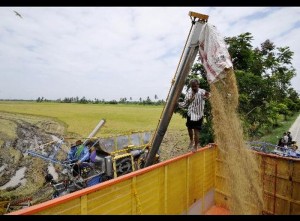The Nation |
July 23, 2009
Thai exporters are expressing concern about the "land-grabbing colonialism" strategy being used by developed nations to reap benefits from agricultural goods grown in a second country and exported to other nations.
Exports under this strategy will directly compete with exporters of agricultural products like Thailand and other developing countries.
Pornsilp Patcharintanakul, deputy secretary-general of the Board of Trade and Thai Chamber of Commerce, said yesterday that the land-grabbing strategy would also harm future export growth of Thailand and other less developed nations.
"Currently, many developed countries such as South Korea are investing in the agricultural sector of African countries as a food-security measure. However, once South Korea's local market is adequately supplied, it could start exporting goods grown in Africa to other countries, which would adversely affect the export of farm goods from Thailand and other countries," he said.
Countries like South Korea also have sophisticated technology and more financial support, Pornsilp noted.
This "land-grabbing colonialism" would not only bring down the export of agricultural goods for developing nations, but they would face tough competition because developed nations would compete to export farm products as well, he explained.
Apart from South Korea, other rich, developed nations in the Middle East have also ensured their food supply by investing in emerging countries.
Chookiat Ophaswongse, president of the Thai Rice Exporters Association, said the land-grabbing strategy resulted from last year's food crisis.
"This is a new phenomenon and we have to accept it because it's beyond our control. Many countries have no policy forbidding foreign investors from investing in their farming sectors," Chookiat said.
He also voiced concern that developed nations would invest in rice plantations in neighbouring countries, which would make things difficult for Thailand in terms of rice export because foreign investors have access to top-notch technology and enough monetary support. Thai rice exports could plunge in the near future, said Chookiat.
Meanwhile, Thai exporters have been urged to make the most of the Generalised System of Preferences (GSP) by increasing exports to 47 countries in Europe.
Speaking at the "GSP Buffet: Route to Increase Export Growth to Continental Europe" seminar, Siripol Yodmuangcharoen, permanent secretary to the Commerce Ministry, said export to Europe is expected to grow by 5-10 per cent next year from US$24 billion (Bt815.9 billion) last year thanks to lower tariffs under GSP. The seminar was organised by the Foreign Trade Department.
So far, about 58 per cent of Thai exporters trading with European countries have utilised the GSP benefit.
Foreign Trade Department deputy director-general Unchana Withayathamthat is also urging Thai exporters to take advantage of the European Union's GSP privileges in order to compensate for losses from the slump in exports.
However, she warned exporters to be careful about the rules of origin, because EU has strict requirements about only raw materials from Thailand being used in goods that are exported under its GSP. Otherwise, Thai exporters will have to pay the normal tariff.
She added that Thailand was also closely monitoring goods from other countries that might be used to |circumvent it from reaping GSP |benefits.
Who's involved?
Whos Involved?
Carbon land deals
Dataset on land deals for carbon plantations
07 Oct 2025 - Cape Town
Land, life and society: International conference on the road to ICARRD+20
Languages
- Amharic
- Bahasa Indonesia
- Català
- Dansk
- Deutsch
- English
- Español
- français
- Italiano
- Kurdish
- Malagasy
- Nederlands
- Português
- Suomi
- Svenska
- Türkçe
- العربي
- 日本語
Special content
Archives
Latest posts
-

KKR acquires ProTen from Aware Super
- Business Wire
- 01 July 2025













